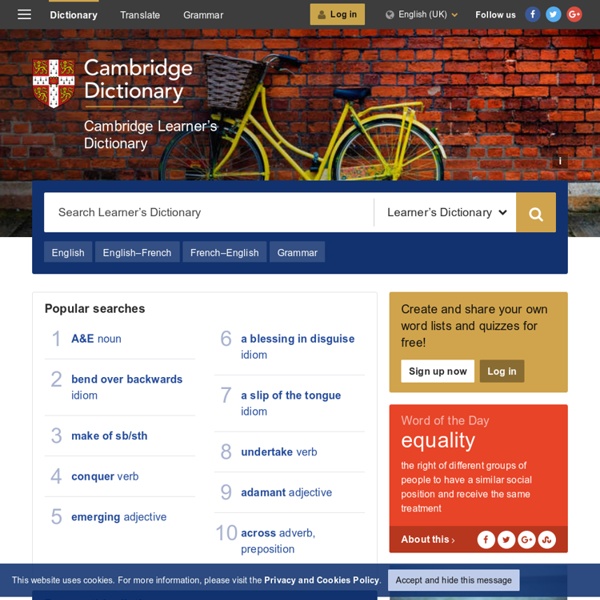ESL Worksheets, English Word Formation, Prefixes, Suffixes
Teach Kids to Read with Phonics - Games, Videos, Worksheeets Word Formation Worksheets Prefixes and Suffixes- Affixes & Root Words to Guess Meaning A prefix is a letter or group of letters added to the beginning of a word to make a new word: In the word '”UNHAPPY”, 'UN-' is a prefix added to HAPPY.
UK slang for international students
By Sophie Cannon at Education UK, 27 January 2014 'Hiya mate, fancy a cuppa and a chin-wag?' 'I can't sorry pal, I'm skint. Gutted!' When you first arrive in the UK for your studies, you might be mystified by some of the words and phrases local people use.
20 Misused Words That Make Smart People Look Dumb
We're all tempted to use words that we're not too familiar with. If this were the only problem, I wouldn't have much to write about. That's because we're cautious with words we're unsure of and, thus, they don't create much of an issue for us.
English Skills: 7 ways of saying “I don’t know”
In this second post dedicated to life skills in English, I’d like to focus on the different ways you can say “I don’t know” in English. As my clients will tell you, saying “I don’t know” to me is not an option in our lessons! I will not allow my clients to rely on me to give them the answers before they have tried themselves to seek the answers.
50 Popular English Idioms to Sound Like a Native Speaker
To understand English as it is spoken in real life, you have to be familiar with idioms. They are used so much in everyday English that it is important to be aware of them. You need to learn what they mean, and how to use them to become an ‘insider’.
Marvellous & Mischievous: Literature’s Young Rebels
A free, family-friendly exhibition bringing together young rebels from children’s literature Anyone can be a rebel, whether they are standing up for their beliefs, saving the planet or battling against the odds. See how characters from Pippi Longstocking to Princess Pearl break rules and defy conventions to make the world a better place for others. Rediscover your favourite characters and the youthful optimism you share with them. Roald Dahl’s handwritten drafts of Matilda sit alongside Quentin Blake’s iconic illustrations, as well as other enduring classics from The Secret Garden to Where the Wild Things Are. Not all rebels are mischievous rogues, some are spirited survivors.
Tim's Free English Lesson Plans
Image credit: teaching.berkeley.edu Follow me on twitter @RobbioDobbio I’m running the Barcelona Half-Marathon dressed as David Bowie to raise money for Cancer Research, sponsor me here: This is a vocabulary lesson originally designed for higher levels (C1+) but the method can be adapted for any level and any set of vocabulary. The idea is that students teach each other a set of phrasal verbs, analyse them and then put them into practice in a gap-fill and a discussion.
English Short Stories – Simple and Illustrated
Improve your English with English short stories. This is the fun way! Important Note Make sure you start with stories at your level, and go gradually up. Do not start with difficult stories that you can't really understand, OK? You can also check out the Learn English Video section.
Koprowski - Ten Good Games for Recycling Vocabulary
The Internet TESL Journal Mark Koprowskimarkkoprowski [at] yahoo.com Introduction Learning is remembering. If we respect this axiom, the review and recycling of new language items will be critical if they stand a chance of becoming readily accessible in long-term memory. In fact, students do the majority of their forgetting shortly after the lesson and then the rate of forgetting diminishes. To avoid this lexical vanishing act, one solution offered is to follow the 'principle of expanding rehearsal'.
Seven steps to vocabulary learning
You might expect that, after having been exposed to a word in ten, twenty, or maybe at the very most thirty, contexts, a learner will gradually piece together the word's meaning and start to use it correctly, appropriately and fluently. Classroom context Seven steps to vocabulary learning Conclusion Classroom context Of course we cannot expect a learner to acquire difficult words in the same way as a young child acquires their first language, but, perhaps as teacher we can somehow help learners to arouse their 'learning monitor' by, for example, providing rich contexts containing the target language and by giving our learners time to reflect on what the language item means. In this way teachers can use the EFL classroom to replicate the real world and nurture strategies to help students understand and produce difficult language items which often seem beyond their grasp. Seven steps to vocabulary learning Here are some practical steps that I have used to help my students.
Nine ways to revise English vocabulary using slips of paper
What can teachers do when classroom technology stops working? Cristina Cabal, latest winner of the British Council's TeachingEnglish blog award for her post on pronunciation, suggests nine activities for revising English vocabulary using simple slips of paper. Nowadays, it seems very simple to plan a lesson that makes use of the many tools available online, especially as more and more of us have access to the Internet in our classrooms. But while technology is increasingly part of our teaching, there are times when it can cause problems and frustrations for teachers, such as when the Wi-Fi stops working or the computer shuts down, leaving you with a one-hour lesson to teach and no plan B up your sleeve.



